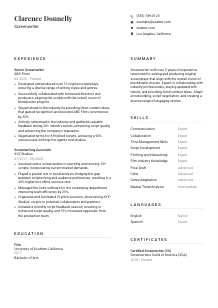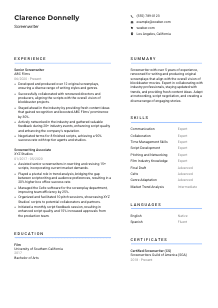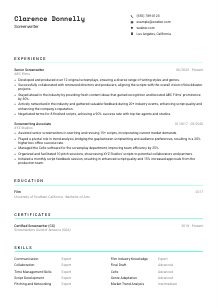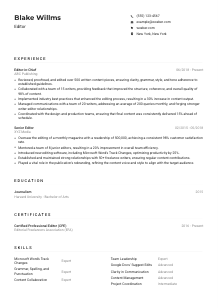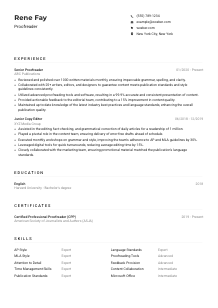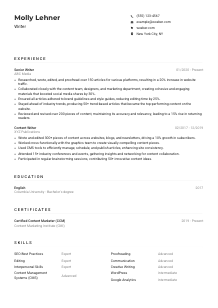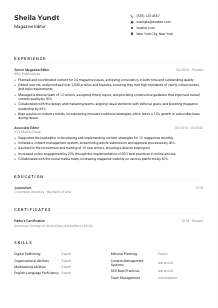Screenwriter Resume Example
Scripting stories, but your resume lacks the right dialogue? Browse this Screenwriter resume example, written out using Wozber free resume builder. Discover how you can seamlessly weave your narrative talents into a compelling career arc, making your writer's journey as engaging as the films you create!
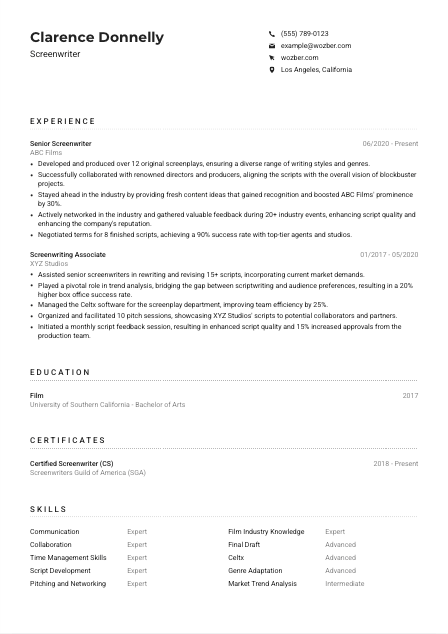
How to write a Screenwriter Resume?
Aspiring Screenwriter, you're about to embark on an exciting journey toward capturing your dream role. Crafting a resume can be as intricate and compelling as plotting a screenplay. Each section of your resume should unfold your story, highlighting your talents and experiences, just as scenes in a film reveal its narrative. With the help of Wozber free resume builder, this step-by-step guide will ensure your resume is not only a reflection of your best self but also tailored perfectly to that Screenwriter position you're eyeing.
Ready to spotlight your career in the best possible frame? Let's roll the camera!
Personal Details
Your personal details serve as the opening credits of your resume. It's brief yet sets the mood for what's about to come. Tailoring this section for a Screenwriter position helps establish your professional identity and pulls the hiring manager into your narrative.
1. Spotlight Your Name
Your name is the title of your professional story. Make it prominent, using a clear, engaging font. Remember, this is the beginning of a compelling script about your career.
2. Role Titling
Just below your name, feature your desired role, "Screenwriter," clearly. It instantaneously indicates your professional alignment and passion, mirroring the job you're applying for.
3. Direct Contact Info
Your phone number and a professional email are your call to action. Make sure these are error-free. A simple, professional email using a variation of your name sets the right tone.
4. Setting Your Stage
"Los Angeles, California" sits proudly in your contact details. In a field where location matters, this strategically aligns you with the job's geographical requirement.
5. Online Portfolio
Your LinkedIn or a personal website showcasing your screenwriting portfolio can be a trailer to your talent. Ensure they are current and reflect the depth of your experiences and skills.
Takeaway
Think of your Personal Details section as your script's teaser. It should invite the hiring manager to keep reading, promising them a journey through the professional landscape of a talented Screenwriter. Keep it clean, straightforward, and meticulously targeted at your role. Ready? Let's dive deeper into the narrative.





Experience
In the narrative of your career, the Experience section holds the tension, the challenges, and the triumphs. It's the plot that keeps the hiring manager engaged. Tailoring this storyline to match the Screenwriter position ensures that your professional journey resonates with what they're seeking.
- Developed and produced over 12 original screenplays, ensuring a diverse range of writing styles and genres.
- Successfully collaborated with renowned directors and producers, aligning the scripts with the overall vision of blockbuster projects.
- Stayed ahead in the industry by providing fresh content ideas that gained recognition and boosted ABC Films' prominence by 30%.
- Actively networked in the industry and gathered valuable feedback during 20+ industry events, enhancing script quality and enhancing the company's reputation.
- Negotiated terms for 8 finished scripts, achieving a 90% success rate with top‑tier agents and studios.
- Assisted senior screenwriters in rewriting and revising 15+ scripts, incorporating current market demands.
- Played a pivotal role in trend analysis, bridging the gap between scriptwriting and audience preferences, resulting in a 20% higher box office success rate.
- Managed the Celtx software for the screenplay department, improving team efficiency by 25%.
- Organized and facilitated 10 pitch sessions, showcasing XYZ Studios' scripts to potential collaborators and partners.
- Initiated a monthly script feedback session, resulting in enhanced script quality and 15% increased approvals from the production team.
1. Scene Setting
Itemize the job requirements, such as 'develop original screenplays.' These will be your guideposts to craft the storyline of your career narrative in the Experience section.
2. Cast of Characters
Structure your experience by specifying roles and companies, leading with your most current or impactful position. This chronological layout helps the recruiter follow your career progression intuitively.
3. Dialogue Highlights
For each role, articulate your accomplishments in a way that speaks directly to the job description. 'Developed and produced over 12 original screenplays' shows not just action but results and diversity, echoing key requirements.
4. Box Office Numbers
Whenever possible, quantify your contributions, like ‘boosted the company's prominence by 30%.' This gives a tangible measure of your impact, making your achievements more relatable and impressive.
5. Relevance is Key
Every detail you include should be a subplot that enriches the main narrative: your qualification for the Screenwriter position. Irrelevant experiences are like unnecessary scenes that can dilute the strength of your story.
Takeaway
Crafting an Experience section that reads like a well-plotted screenplay is your goal. Each element from "action" (role and achievements) to "reaction" (quantified impact) showcases your fit for the Screenwriter role. Visualize the hiring manager nodding in approval, captivated by your career story. Now, let's move on to the foundation of all this: your educational background.
Education
In the screenplay of your career, the Education section provides the backstory that informs your character. It's where your professional narrative began. Tailoring this section to resonate with a Screenwriter's role lays the foundation for understanding your qualifications.
1. The Inciting Incident
Identify the educational requirement from the job post – in this case, a "Bachelor's degree in Film, English, or related field." This is where your character's journey starts.
2. Simple Structure
Maintain clarity in the portrayal of your educational journey. Degree, field, institution, and graduation date should be stated simply yet effectively, providing easy access to this crucial information.
3. Character Depth
Reflect on how your degree especially prepares you for a Screenwriter's role. If you studied Film, this direct correlation should be highlighted to show you have the foundational knowledge required.
4. Relevant Training
While the broader degree may cover it, mentioning specific relevant coursework or seminars can add to your character's depth, showing specialized learning that has shaped your screenwriting craft.
5. Additional Achievements
Any honors, relevant clubs, or special projects you undertook during your education that directly relate to screenwriting or the broader film industry can serve to enrich your backstory, proving your long-standing commitment to this art form.
Takeaway
Your Education section underlines your origins and the formative experiences that equipped you for the Screenwriter role. It's the grounding element of your resume, providing the baseline upon which your career story builds. With the academic foundation set, let's move on to spotlight any certifications that further credential your expertise.
Certificates
While the main script of your resume is gripping, adding a section on certifications can serve as a compelling subplot, adding depth to your qualifications. For a Screenwriter, this could include screenwriting workshops or industry-recognized accreditations.
1. Setting the Scene
Begin by gathering any certifications that underscore your screenwriting skills or knowledge of the industry. Although not explicitly mentioned in our job description, possessing niche certifications can set you apart.
2. Selective Focus
Prioritize certifications most relevant to screenwriting or associated skills, such as storytelling or script analysis. This ensures the hiring manager's attention is pulled towards your specialized qualifications.
3. Timing and Relevance
Mention the acquisition date, particularly if it's a recent achievement. This shows you're actively engaged in honing your craft, keeping your skills sharp and current. Remember, the film industry values continual learning.
4. Always in Motion
A commitment to ongoing professional development is crucial in the ever-evolving world of screenwriting. Regularly seek out opportunities to learn and gain certifications that enrich your expertise and adaptability.
Takeaway
Certificates may be a smaller part of your resume, but they carry the weight of demonstrating your ongoing commitment to screenwriting excellence. By thoughtfully selecting and presenting these accomplishments, you reinforce your dedication to the craft. Let's continue to sharpen your toolkit with a fine-tuned Skills section.
Skills
The Skills section of your resume is where you get to shine a spotlight on the abilities that make you an exceptional Screenwriter. Think of this as your chance to showcase the techniques, styles, and tools you've mastered that make your writing cinematographically alive.
1. Uncover Hidden Clues
Dive into the job description to uncover both stated and implied skills needed for the role. Screenwriting necessitates a blend of creativity, technical prowess, and industry savvy.
2. Tailored Inventory
From your palette of skills, highlight those that best match the Screenwriter position. For example, your expertise in "Final Draft" or your exceptional "Genre Adaptation" abilities are key skills to list.
3. Organized Showcase
Resist the temptation to list every skill you possess. An ATS-compliant resume benefits from clarity and conciseness. Prioritize skills based on their relevance to screenwriting, ensuring they're easily identifiable by both human recruiters and ATS resume scanners.
Takeaway
Your Skills section is essentially your professional signature – a unique blend of abilities that defines your screenwriting style and approach. Make each skill count, highlighting your readiness for the role and your potential for impact. With your toolkit well laid out, let's tune into the diverse worlds you can navigate through your language proficiency.
Languages
In the cosmopolitan world of film, being multilingual can open doors to global stories and diverse audiences. The Languages section is your chance to showcase how your linguistic talents can contribute to rich, authentic screenwriting that resonates across cultures.
1. Scripting in Multiple Tongues
Start by assessing if the Screenwriter position hints at a preference for specific languages. Even if it doesn't, knowing how to weave narratives in different languages can be a unique asset.
2. Lead with the Blockbusters
Position the languages most relevant to the role or most fluent in at the top. This isn't just about fluency but also about showcasing your adeptness at cultural nuance and dialogue authenticity.
3. Supporting Cast
List other languages you are familiar with, rating your proficiency honestly. This adds depth to your profile, showing a diverse range of narrative tools at your disposal.
4. Critical Acclaim
Use clear descriptors like ‘Native' or ‘Fluent' to delineate your language proficiency levels. This gives recruiters a quick sense of how and where you can contribute linguistically.
5. The Global Box Office
For Screenwriters, the ability to script multilingual dialogues or to grasp the subtleties of cultural storytelling can significantly enhance your appeal, especially for projects with international exposure.
Takeaway
Your linguistic abilities enrich your screenwriting, offering layers of depth, authenticity, and global appeal. As you continue to learn and embrace new languages, consider each one a door to richer narratives and wider audiences. Now, let's draw this to a close with a powerful summary that encapsulates your prowess.
Summary
Your summary is the last scene of your resume's first act, where you encapsulate your journey, skills, and what makes you the ideal candidate for the Screenwriter role. This is your pitch, your moment to shine succinctly, compelling the hiring manager to dive deeper into your narrative.
1. The Hero's Journey
Distill the essence of the Screenwriter position from the job description. This understanding informs how you pitch yourself, aligning your narrative with the role's demands.
2. Your Opening Line
Begin with a broad statement about your professional self. "Screenwriter with over 5 years of experience" sets the stage, giving a sense of your journey's breadth and depth.
3. Highlight Reel
Pinpoint a few of your most relevant skills and notable accomplishments. This is where you show, not just tell, the hiring manager about the unique impact you've made in your field.
4. The Tagline
Keep it brief and impactful. Aim for 3-5 lines that encapsulate why you're not just a fit but the standout choice for the role. This is your script's tagline – make it memorable!
Takeaway
With a compelling summary, your resume is now well-positioned to catch a hiring manager's attention. This forward-facing glimpse into your career promises a deep dive into the script of you – an engaging story of a qualified, passionate Screenwriter. As you fine-tune each section, remember to harness the power of Wozber's ATS-compliant resume templates and ATS resume scanner for optimization. Your resume is your script for success. Make every word count, and let's get you ready for the spotlight!
The End: Your Screenwriter Journey Begins
Congratulations! You've just taken a pivotal step toward landing your dream Screenwriter role. Each section of your resume has been carefully crafted to reflect the unique story of your professional journey, tailored precisely for the role you aspire to. Remember, your resume is a living document, evolving with every new skill, experience, and achievement.
Use Wozber free resume builder to ensure your screenplay—your career—remains engaging, current, and, above all, uniquely yours. The director's chair awaits; it's your time to take action!

- Bachelor's degree in Film, English, or related field.
- Minimum of 3 years of professional experience as a screenwriter, or in a relevant field such as journalism or storytelling.
- Strong portfolio showcasing a diverse range of writing styles and genres.
- Excellent communication, collaboration, and time management skills.
- Familiarity with industry-standard screenwriting software, such as Final Draft or Celtx.
- Must be located in Los Angeles, California.
- Develop original screenplays, rewriting and revising as necessary.
- Collaborate with directors, producers, and other team members to ensure the script aligns with the overall vision of the project.
- Stay up-to-date on current trends, competitors' work, and market demands to provide fresh content ideas.
- Attend meetings, pitch sessions, and industry events to network and gather feedback on scripts.
- Negotiate the terms of sale or optioning of finished scripts with agents, producers, or studios.





